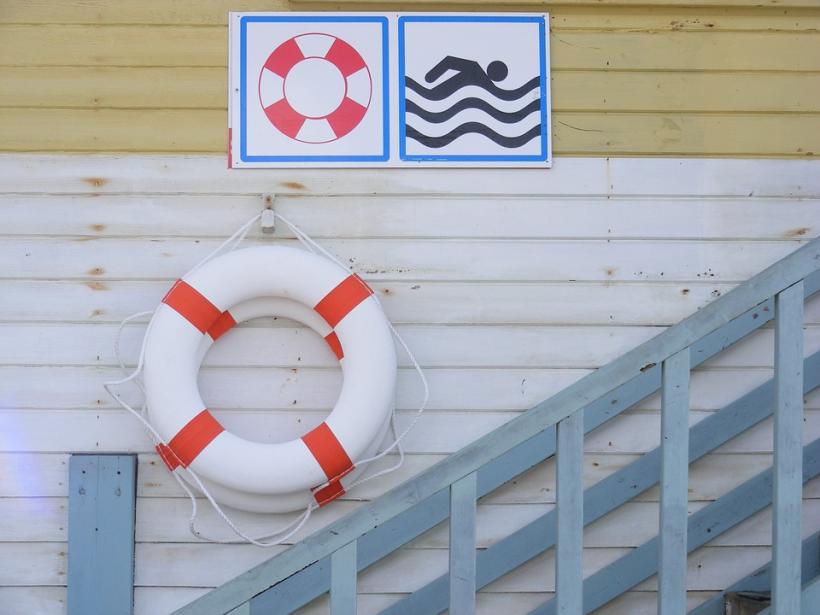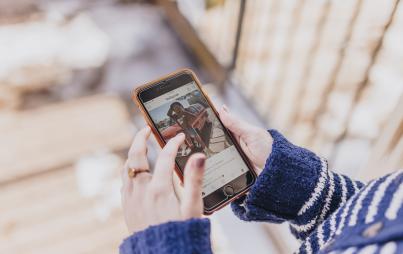
I loved the pool with the all-consuming fervor I reserved for so many of summer’s pleasures. Image: alondav/Pixabay.
My feminist body positivity couldn’t just be reserved for other women, other fat bodies. I had to face down the self-loathing and clock in.
From my earliest memories of splashing my siblings at the community swimming pool, I had an idea of what lifeguards looked like: young, tall, and lithe, with tanned limbs and form-fitting swimsuits meant to accentuate the athleticism of their bodies.
Lifeguards were the stand-ins for our parents and teachers, the seasonal authority figures who wore shiny sunglasses and smelled like some strangely enticing combination of menthol cigarettes and Coppertone.
Those stern teenage demigods were quick to admonish us if we ran along the cement edges of the pool — and, if we wailed on other kids with our neon-colored Styrofoam noodles, we might as well pack up our towels and go.
They forced us to take breaks every hour, and we counted the minutes until the long trill of their silver whistles blasted through the stillness of the summer air, signaling that all children could, at long last, return to the chlorinated waters whence we came.
I loved the pool with the all-consuming fervor I reserved for so many of summer’s pleasures — cherry Popsicles from the ice cream truck, long afternoons curled up with my most cherished books, air-conditioned movie matinees, and elaborate backyard games. But those activities usually came at a steep price — and with a single mother who struggled to pay the bills for four children, I realized that any spending money would have to be earned from other sources.
I still lacked a driver’s license when I was finally old enough to apply for summer jobs, so any job I took had to be within walking distance. I put in an application with the management company for the neighborhood pool, located less than 500 feet from my house.
On a cloudy weekend in May of 2002, I attended a lifeguard certification course. Twenty laps, CPR training, and picking up a brick from the bottom of the pool didn’t seem so hard. I was surprised when another student dropped out after claiming the course was “too demanding.”
But now I wonder if there were other reasons for leaving, issues that had less to do with being a strong swimmer and more with not “looking the part.”
For my part, I was 16 years old — and I didn’t look like a skinny lifeguard. Throughout high school and college, my weight fluctuated from sizes 12-16. Even writing this now makes me nervously gulp a little, as if someone had peeked into my proverbial closet and spotted the source of my worst insecurities, lying in a heap of plus-size clothing tags.
More often than not, my co-workers at the new sites were cute teenage guys — and, to my astonishment, several of them passed the time by flirting with me.
Given the requirements of the job, I wasn’t going to be able to get away with wearing a baggy T-shirt over my one-piece work uniform. Yet, instead of making me lament the fat on my body, the experience actually taught me to appreciate the gift of being a teenage girl who was forced to wear a swimsuit to work six days a week.
My feminist body positivity couldn’t just be reserved for other women and other fat people. I had to face down the self-loathing and clock in.
With this opportunity, I felt I could break the tired conventions of the Baywatch bikini — and maybe even show other chubby kids who loved to swim that they could do this job, too. I could be a lifeguard with a belly and thick thighs — and still save drowning swimmers, still swim daily laps with a lazy breaststroke. I could hold my breath as needed.
I could trust in my body.
In those five years of lifeguarding, my job was ideal: I didn't have a daily supervisor standing over me, micromanaging my every move. Instead, I learned to multitask, and developed my own routines for getting through the checklist of activities required to keep the pool in good condition and the county health inspector from ever closing it down.
And once I finished cleaning the pool and running through the list, the day was mine. In those patron-less periods at the pool, I could read, study for the SATs, write my college applications, listen to my CDs, have friends over to visit, and talk on the phone.
Occasionally, I was called to fill-in for an absent lifeguard at a different pool. More often than not, my co-workers at the new sites were cute teenage guys — and, to my astonishment, several of them passed the time by flirting with me. We chatted about our favorite movies, then exchanged phone numbers.
Once, I spent a rainy afternoon in the pump room basement, making out with a curly blonde college student. Embarrassed by my impulsiveness, I pretended not to recognize him at the following year’s CPR class.
When I go back and read through the journal entries from those years of guarding the pool, I can see how those persistent negative thoughts about my body shifted into something more proud, self-aware, and true:
I work a job that forces me to confront this whole I-have-a-body concept. When I look in the mirror, what do I see? Hair that’s been dyed Dark Burgundy Brown twice this summer, the roots grown in slightly. Thick, European-looking eyebrows, eyelashes that don’t respond well to mascara. Shoulders dotted with dark freckles, hands that sport black nail polish and chocolate stains. Breasts that change the look of any shirt which comes upon them; hips that curve my figure into an hourglass, without the super-super skinny middle. I see pale skin with tan lines.
All my interests and styles come together in this body; they form the symphony that is me.







